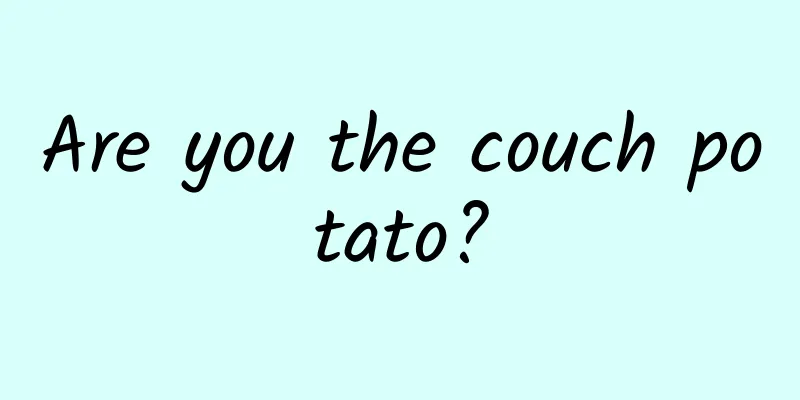Are you the couch potato?

|
Photo/Chen Meilin Guangxi Academy of Medical Sciences, Guangxi Zhuang Autonomous Region People's Hospital Reviewer/Jia Yongxing Executive Editor of Popular Medicine Magazine, Shanghai Science and Technology Press After getting home from get off work, do you lie on the sofa unwilling to move, watching TV, playing with your phone, playing games, holding a drink and eating snacks? You may be a typical "couch potato". Figure 1 Copyright image, no permission to reprint What is a “couch potato”? The term couch potato was first coined by a cartoonist in the 1970s who drew lazy, sedentary characters and dubbed them "couch potatoes." Since then, the phrase has become a popular term used to describe people who spend a lot of time in front of the television. In 1993, the term "couch potato" was included in the Oxford English Dictionary, which defined it as "a lazy person who kills time watching TV and videos". However, as entertainment methods change, "couch potatoes" are no longer limited to watching TV. Watching TV series and playing games on mobile phones have become new ways of life and entertainment for modern "couch potatoes". In 1997, the World Health Organization stated: "The 'couch potato' culture is a threat to human health." Figure 2 Copyright image, no permission to reprint What are the dangers of being a couch potato? Being a "couch potato" may increase the risk of many chronic diseases. The first is the snacks and drinks that accompany you to spend happy time on the sofa. Common puffed snacks, fruit juices and carbonated drinks, as well as hamburgers, fried chicken and other foods, their common characteristics are high calories, single nutrition, lack of calcium, phosphorus, iron, vitamins and other nutrients. Long-term intake will cause excess energy, and excessive energy will accumulate in the body in the form of fat, leading to obesity. It is well known that obesity is a risk factor for many chronic diseases, including cardiovascular disease. A study published in the Journal of the American College of Cardiology found that compared with those who spend less than 2 hours a day in front of the screen for entertainment, those who spend ≥4 hours a day on screen entertainment activities have a 48% increased risk of all-cause mortality, and those who spend ≥2 hours on screen entertainment activities have an increased risk of cardiovascular disease events by about 125% []. Therefore, do you dare to "take root" on the sofa when you get home from get off work? Figure 3 Copyright image, no permission to reprint Does exercising mean you’re no longer a couch potato? No, you may be an active couch potato. An active couch potato is someone who works out every day but still spends time on the couch when they get home. Active couch potatoes can reduce the incidence of some diseases compared to couch potatoes who don't exercise at all. A New Zealand study compared people who sat for 18 hours without exercise (the "couch potato group") with people who exercised for 30 minutes between two 9-hour periods of inactivity (the active couch potato group), and compared these two groups with a third group that only exercised for 2 minutes every 30 minutes (the light exercise group). The results showed that blood sugar levels increased in the couch potato and active couch potato groups, and that the light exercise group had better blood sugar control[]. The results of the above studies suggest that: Reduce your sitting time and junk food intake and say goodbye to being a couch potato. Try to develop hobbies, get out more often, and gradually reduce the time you spend "rooting" on the sofa. Try to be an active person and get up and move around every half hour or hour. For modern people, it is important to change the way of relaxation, try not to be a "couch potato" or to be a more active "couch potato" who loves exercise. Figure 4 Copyright image, no permission to reprint |
>>: “Does artificial intelligence need to be like humans?”
Recommend
Reference for advertising data in various channels in the tourism industry!
Industry: Tourism industry Business products: Tou...
How to choose products in Douyin live broadcast room? Four major factors in product selection!
It is said that Douyin sales rely on “70% product...
【Practical】Mobile QQ and Qzone Speed Optimization Practice
About the Author: Huang Haoyu Currently working i...
What are the channels for promoting Tik Tok? Here are 5 tips for you!
How to promote Tik Tok ? What are the channels fo...
Troubleshooting and solutions for wild pointer issues in Dewu H5 container
1. Background After the release of Dewu iOS 4.9.x...
China Brand Day, the 25 most popular Chinese brands among the public!
Today, May 10th, is the second " China Brand...
Are luxury goods suitable for TikTok marketing? ?
Last week, TikTok officially announced that its g...
3 tips for information flow optimization + 8 cases, if you don’t believe me, you can’t do it well!
With the arrival of winter vacation, many busines...
HTC M8 Full Disassembly
After removing the SIM card and micro SD card slot...
Comic strip | The famous "China Beidou" is actually related to my "Double Eleven" shopping spree?
...
9 major trends in short video content marketing in 2020
In 2019, all good things came at the right time. ...
The boy who started the fantasy journey is a beggar eel? !
Searching for flower eels - Environmental DNA eco...
Community monetization: the unbearable pain of community operators
1. Why do we need to talk about monetization? Wha...
Authoritative appraisal for Children's Day: Which baby's temperament is more suitable for the white version of Kindle Paperwhite3?
It is said that on Children's Day, all the &q...
How can educational institutions achieve online distribution and content fission?
Affected by the epidemic, more than 200 million p...









